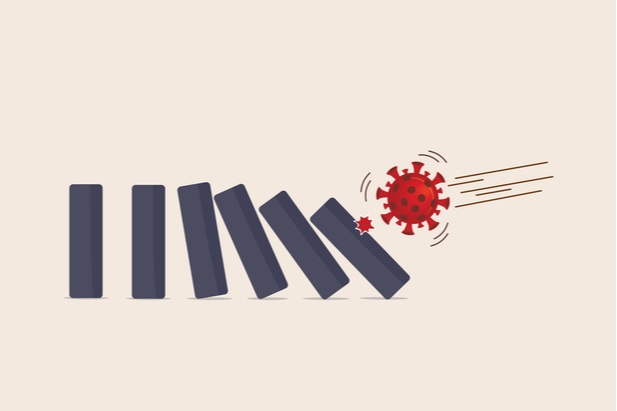COVID has changed the employment landscape in the last few years and will continue to have an impact for years to come. With over 81 million people diagnosed with COVID, according to the AMA, it is estimated that 10-30% of those patients will develop residual symptoms or medical complications, known as long COVID, for months or years to come.
Long COVID can be a life-changing disability
Employees may unknowingly be suffering from symptoms that can impact their ability to work such as chronic fatigue, brain fog, mental illness, chronic shortness of breath, migraines, and other complex medical issues. COVID is not just a respiratory disease, but a multi-systemic inflammatory disease, and employers need to understand their social and legal obligations to their employees. Failure to understand these obligations can be costly to employers directly from discrimination lawsuits, workplace injuries or other liability for other accidents caused by employees or product liability from substandard production, as well as, indirectly in the costs to re-hire or retrain. Employers may have made it through the COVID shutdowns and disruption from COVID in 2020 and 2021, but long COVID can result in continued disruptions and financial implications long into the future.
Recommended For You
Disability-related legal obligations of long COVID
The US Department of Health and the Department of Justice have released guidance that explains that long COVID can be a recognized disability under the Americans with Disabilities Act (ADA). So, when a truck driver returns after a bout of COVID, complains to his manager that he is unable to take any long-haul routes and requests to be placed on short-haul routes because of his chronic fatigue, the manager must be prepared and trained. Employers need to avoid the pitfalls that can lead to lawsuits for discrimination. There may be no outward signs of disability, but it is important that managers are trained to remove their personal or political beliefs about COVID and recognize when an employee is asking for an accommodation related to their disability. Managers should also be trained to begin the interactive process with an employee to determine if a reasonable accommodation could or should be made. In this example, an untrained manager that will simply fire this individual will get the company in trouble and on the wrong side of a lawsuit.
Safety issues from long COVID
All employers have a general duty to provide a safe working environment for their employees, as mandated by OSHA. With potentially 24 million employees suffering from long COVID symptoms, there is a greater risk of workplace injuries and accidents. Especially in heavy labor industries or any industry with driving exposure, chronic fatigue, brain fog, and other long COVID symptoms present an inherently greater risk of employees sustaining an injury to themselves, co-workers, or even the public. It is important that employers ensure that their employees can perform the essential functions of their positions. Adopting a physical ability testing program for these heavy labor functions presents an option to prevent or reduce workplace accidents. Also, encouraging physical fitness, partnering with a local gym for discounts, or enhancing the benefits package with these amenities can help improve the fitness of employees and potentially avoid serious workplace injuries.
Employers must remember that if they have a serious event such as an employee working on an assembly with brain fog, who has a crush injury from a machine and is admitted to the hospital, this must be reported to OSHA. When OSHA investigates, they will look at the whole operation, not just the accident. OSHA violations can lead to thousands of dollars in fines and penalties, not to mention that the severity of the employee's injuries will likely lead to an increased workers' compensation premium. These are also financial considerations employers must face with employees who continue to suffer from long COVID conditions.
Long COVID's impact on attracting and retaining staff
In order to retain the best employees and hire the best, employers have a social obligation to support their employees with flexibility and benefits. With unemployment at its lowest point since the pandemic began, employers continue to struggle to fill open positions and retain staff. Robust benefits offerings can help retain staff and entice new recruits. Consider adding an EAP program or enhancing discount offerings to gyms or wellness programs that are enticing to employees and can help improve their overall health and well-being. For those employees suffering from long COVID, these programs can provide the additional resources they need to assist in recovery, such as mental health treatment. It's also important that employees know what is available to them, so employers should send monthly reminders of the benefits they have or offer incentives to encourage their use. Wellness programs such as those where employees can receive a free Apple watch can be very enticing to employees to encourage participation. A healthier workforce will lead to less financial disruption now and into the future.
Long COVID will play a pivotal role for employers now that we are beyond the initial impacts of the pandemic. Those employers who are prepared and plan for these complications will be better positioned for the future impacts. Understanding the social and legal obligations of employing those with long COVID will lessen the direct and indirect costs that can arise from events and accidents sustained by these employees.
Julie Cirillo is the chief risk officer at Engage PEO. She has more than 20 years of experience in workers' compensation litigation, claims management, and risk management. She is a former workers' compensation defense attorney and has held multiple senior roles in management, claims, loss prevention, risk management, and sales.
© 2025 ALM Global, LLC, All Rights Reserved. Request academic re-use from www.copyright.com. All other uses, submit a request to [email protected]. For more information visit Asset & Logo Licensing.








